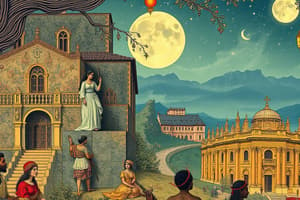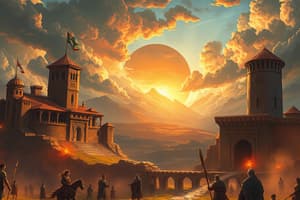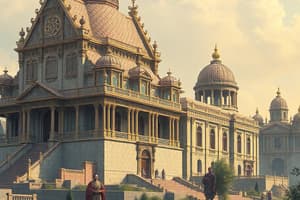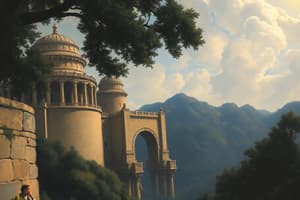Podcast
Questions and Answers
What was a significant outcome of the Magna Carta in 1215?
What was a significant outcome of the Magna Carta in 1215?
- It was the first document to abolish slavery.
- It initiated the Protestant Reformation.
- It established the concept of absolute monarchy.
- It limited the power of the king and guaranteed certain rights. (correct)
Which characteristic best defines the concept of 'Athenian Democracy'?
Which characteristic best defines the concept of 'Athenian Democracy'?
- Only wealthy landowners could participate in government.
- Direct participation by citizens in decision-making processes. (correct)
- Political power was held by a small elite group of nobles.
- Power was divided among several kings.
What was one of the main impacts of the Black Death on European society?
What was one of the main impacts of the Black Death on European society?
- The decline of feudalism and the rise of a more mobile workforce. (correct)
- The unification of all European nations under one monarchy.
- A significant increase in population growth.
- Enhanced social order and stability across the continent.
Which statement best describes the role of women in ancient civilizations?
Which statement best describes the role of women in ancient civilizations?
Which of the following was a key feature of the Silk Road?
Which of the following was a key feature of the Silk Road?
What was a primary outcome of the Agricultural Revolution?
What was a primary outcome of the Agricultural Revolution?
Which characteristic most distinguishes monotheistic religions from polytheistic ones?
Which characteristic most distinguishes monotheistic religions from polytheistic ones?
What significant change occurred during the Neolithic Revolution?
What significant change occurred during the Neolithic Revolution?
Which of the following best defines the concept of feudalism?
Which of the following best defines the concept of feudalism?
In what way did the Crusades significantly affect Europe?
In what way did the Crusades significantly affect Europe?
Which civilization is best known for its extensive trade network known as the Silk Road?
Which civilization is best known for its extensive trade network known as the Silk Road?
Which of the following best describes the Athenian concept of citizenship?
Which of the following best describes the Athenian concept of citizenship?
Which event is closely associated with the spread of Christianity during the early centuries?
Which event is closely associated with the spread of Christianity during the early centuries?
Which document is often considered a foundational element in the establishment of the rule of law in England?
Which document is often considered a foundational element in the establishment of the rule of law in England?
What was a key result of the nomadic lifestyle during the Paleolithic Age?
What was a key result of the nomadic lifestyle during the Paleolithic Age?
Flashcards
Agricultural Revolution
Agricultural Revolution
The shift from nomadic hunting and gathering to settled agriculture.
Monotheistic Religions
Monotheistic Religions
Religions that worship one god.
City-State
City-State
A city that with its surrounding territory forms an independent state.
Feudalism
Feudalism
Signup and view all the flashcards
Revolution
Revolution
Signup and view all the flashcards
Bubonic Plague
Bubonic Plague
Signup and view all the flashcards
Ancient Greece
Ancient Greece
Signup and view all the flashcards
What is the Rule of Law?
What is the Rule of Law?
Signup and view all the flashcards
How was Athenian Citizenship unique?
How was Athenian Citizenship unique?
Signup and view all the flashcards
What are the Ten Commandments?
What are the Ten Commandments?
Signup and view all the flashcards
The 4 River Valley Civilizations
The 4 River Valley Civilizations
Signup and view all the flashcards
Roles of Women in Ancient Civilizations
Roles of Women in Ancient Civilizations
Signup and view all the flashcards
Black Death
Black Death
Signup and view all the flashcards
What are the effects of the Mongol Invasions?
What are the effects of the Mongol Invasions?
Signup and view all the flashcards
What is Hellenistic Culture?
What is Hellenistic Culture?
Signup and view all the flashcards
Study Notes
World History Final Exam Review
- Bubonic Plague: A historical pandemic.
- 4 River Valley Civilizations: Ancient civilizations located near large rivers.
- Athenian Citizenship: Athenian rights and responsibilities of citizens.
- Magna Carta (1215): Landmark document limiting the power of the English monarchy in 1215.
- Athenian Democracy: Ancient Athenian system of government involving citizen participation.
- Monotheistic Religions: Religions centered on one God, including Judaism, Christianity, and Islam.
- Buddhism: A religion and philosophy founded by Siddhartha Gautama.
- Rule of Law: Concept that everyone is subject to and accountable under the law.
- Paleolithic Age: Early period of human history marked by nomadic existence and stone tool use.
- Ancient Greece: Civilization known for its advancements in philosophy, democracy, and art.
- Agricultural Revolution: Shift from nomadic hunting and gathering to settled agriculture.
- Neolithic Revolution: A notable part of the Agricultural Revolution.
- Christianity: A religion based on the teachings and life of Jesus Christ.
- Black Death: A devastating pandemic caused by the bubonic plague.
- Arab Merchants: Traders involved in significant historical trade routes.
- Feudalism: A social hierarchy system prevalent in medieval Europe.
- Roles of Women in Ancient Civilizations: Overview of women's positions in ancient societies.
- Sparta vs. Athens: Comparison of the two major Greek city-states.
- Roman Empire: Huge ancient empire covering a large part of Europe and North Africa.
- Roman Republic: Ancient Roman government system before the empire.
- Byzantium: Eastern Roman Empire after the fall of the Western Roman Empire.
- Athenian Voting Rights: Details on voting rights in ancient Athens.
- Silk Road: Ancient trade routes connecting East and West.
- Crusades: Military expeditions by European Christians to reclaim the Holy Land.
- Jesus: Founder of Christianity.
- Ancient Israel: Ancient kingdom in the Middle East, a significant player in religious history.
- Ancient Chinese Inventions: Major inventions by ancient Chinese people.
- World Population Trends: Overview of population changes over time.
- World Religions: General overview of major global religions.
- Alexander the Great: Powerful military leader expanding the Greek empire.
- Hellenistic Culture: Culture formed from the mixing of Greek and other cultures.
- Islamic Religion: A monotheistic religion with teachings from the Quran and prophet Muhammad.
- Effects of the Mongol Invasions: Significant impacts of the Mongol invasions in history.
- Impact of the Crusades on Europe: The effects of the crusades on the European continent.
- Twelve Tables of Roman Republic: Significant legal code established in the Roman Republic.
- Ten Commandments: A set of moral and religious principles, central to Judaism and Christianity.
- Ancient Sumerians Inventions: Notable inventions of ancient Sumerians.
- Cultural Diffusion: Spread of cultural traditions from one place to another.
- Nomad: People who move from place to place in search of food or resources.
- Revolution: Significant change or overthrow.
- Monarchy: A form of government where a single person, a monarch, holds power.
- Feudalism: A social hierarchy in medieval Europe.
- Republic: A form of government where citizens elect their leaders.
- Clergy: Religious leaders.
- Karma: Concept of cause and effect; important in many Eastern religions.
- Aristocracy: A form of government where a small, privileged group rules.
- City-State: Independent self-governing city and its surrounding territory.
Studying That Suits You
Use AI to generate personalized quizzes and flashcards to suit your learning preferences.




